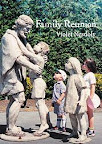Title: The Best of Wilfred Grenfell
Author: Wilfred Grenfell, edited by William Pope
Publisher: Nimbus Publishing, May 2006, Paperback, 179 pages
ISBN-10: 1551095815
ISBN-13: 978-1551095813
“’To believe is to do,’ Wilfred Grenfell said, and his 40 years as a medical missionary along the rugged Labrador coast amply illustrated his words. He was a prolific writer, fundraiser and traveler but it was his faith that empowered his life and gave it meaning; it enabled him to accomplish great tasks to the amazement of others and made him a legend even during his lifetime.”
Thus editor William Pope sums up the life of Sir Wilfred Grenfell. It opens the introduction to The Best of Wilfred Grenfell, a collection of eleven short pieces by this British medical doctor and missionary to Labrador and Newfoundland from 1892 to 1934.
Grenfell was born in Parkgate England in 1865. Though his father was a clergyman, Grenfell had no religious leanings until one evening when he was 20. Returning from a sick call (he was already training to be a doctor) he happened upon a large tent where Dwight Moody was holding meetings. He sat down to listen and as a result of the message that night he decided to commit himself to Christ. That decision changed the course of his life. He eventually became involved in the North Sea Mission to Fishermen but when he heard of the need for medical services along the Labrador coast, he volunteered to work there.
Along the rugged coastlines of Newfoundland and Labrador he traveled by boat, kayak, canoe or dog sled to wherever he was needed. He loved Labrador’s majestic beauty and considered the cold, primitive conditions, and rugged landscape a challenge and adventure. During his 40+ years of work he attended to the medical needs the people by traveling to them and building village hospitals. His efforts soon branched into other areas such as establishing schools, orphanages, and doing whatever he could to improve the life of the people.
From the hundreds of articles and 33 books he wrote, the eleven pieces collected here give us a taste of his range. The stories, authored from 1909 to 1932, are not in date order. The collection begins with adventure stories like Grenfell’s horrendous experience of drifting out to sea with his dogs on an ice pan. Other incidents involving Grenfell and local characters include tales of storms at sea, a starving trapper and a fisherman guilty of insurance fraud. Reflective essays on marriage, the importance of stewarding one’s body and his manifesto of faith “What Christ Means To Me” conclude the book.
Grenfell is a wonderful storyteller. He writes with a natural sense of timing and incredible detail and specificity, speaking of oilskins, komatiks, pan, sish and slob ice with the ease and familiarity we talk of jackets, cars, and road conditions. In many places he writes conversations in dialect, giving the tales extra color and realism. Though his English in some pieces may seem complex, his archaic style reminds us that these writings are up to 100 years old. Even the bits of clay prose are worth the slog, however, for Grenfell was a remarkable man with important things to say.
He downplays his own role in many of these incidents but the way the people respond to him show that he was loved and trusted as a leader and example in the community. Grenfell comes across as an idealist, but one who believed in working, not just dreaming. He articulates his moral and spiritual ideals especially clearly in the essays about marriage, the human body and what Christ means to him. Note these quotables from that selection:
“Christ has become to me to mean more and more doing something, anything well.” p. 156
“God’s challenge to us is only to do whatever we can. Christ’s religion is as natural as the flowers in spring, and relates to the everyday things around us.” p. 156
“A lesson much needed and one which true loved calls for, is always to be optimistic. Never again will I be pessimistic because I cannot see the Christ bringing in His Kingdom in my way. If my boy promises me that he will not smoke, and I find a used pipe in his coat pocket, I do not say anything, I just trust him.” p. 158
Black and white photo reproductions showing Grenfell in his various roles are sprinkled throughout the text. There is a map of the area where he worked and a list of his publications at the back of the book.
This collection is a treasure for many reasons. It accounts rare early 1900s stories of life on the Labrador and Newfoundland coasts. It provides history from one of Canada’s little-known mission fields. But most of all, it introduces us to a pioneer hero whose example in character and lived-out faith are needed as much today as ever.
*****************
More on Grenfell:
Many of the local projects that Dr. Grenfell established continue:



































